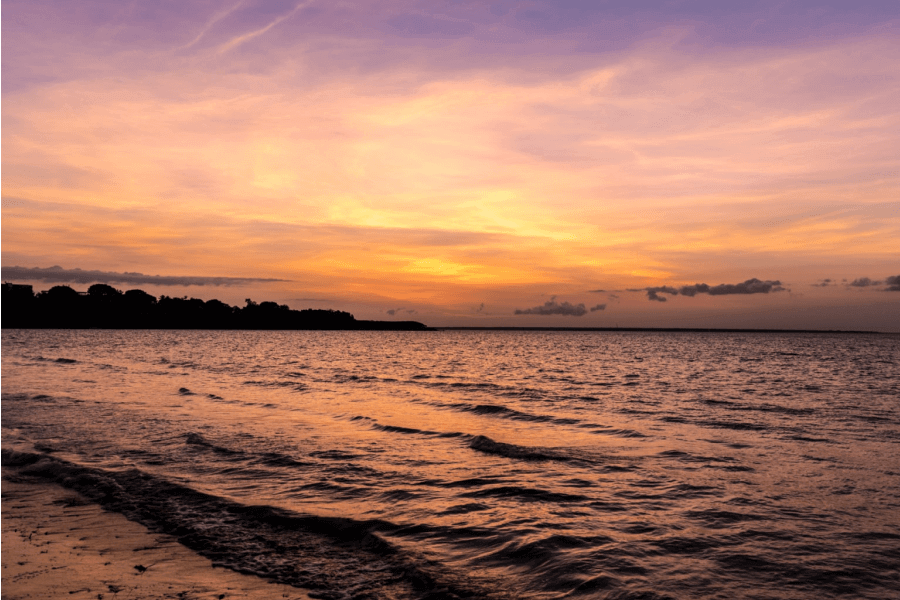Joanne:
Hi you must be Rob Nice to meet you. So, I hear you're planning to visit Australia.
Rob:
Yeah and I really wanted to talk to you because I was thinking of spending some time in Darwin and my sister told me you're from there.
Rob:
So tell me about it.
Joanne:
Well .. where shall I start . . well, Darwin's in what they call the ’top end’ 'cause it’s right up at the northern end of Australia and it’s quite different from the rest of Australia in terms of cultural influences - in fact it’s nearer to Jakarta in Indonesia than it is lo Sydney, so you get a very strong Asian influence there.
Joanne:
That means we get lots of tourists - people from other parts of Australia are attracted by this sort of international, cosmopolitan image. And as well as that, we've got the same laid back atmosphere you get all over Australia - probably more so if anything, because of the climate.
Joanne:
But, what a lot of the tourists don't realise until they get there is that the city's also got a very young population .. the average age is just 29, and this makes the whole place very buzzy.
Joanne:
Some people think that there might not be that much going on as far as an and music and dancing and so on are concerned, because it's so remote.
Joanne:
I mean, we don't really get things like theatre and opera in the same way as-cities down in the south like Sydney, for example, because of the transport expenses.
Joanne:
But in fact what happens is that we just do it ourselves lots of people play music, classical as well as pop, and there are things like artists groups and writers groups and dance classes - everyone does something, we don't just sit and watch other people.
Rob:
You said it's very international?
Joanne:
Yeah, they say there's over 70 different nationalities in Darwin. For instance, there's been a Chinese population there for over 100 years we've even got a Chinese temple. It was built way back in 1887, but erm, when a very bad storm a a cyclone in fact hit Darwin in the 1970s it was almost completely destroyed.
Joanne:
The only parts of the temple that survived were part of the altars and the stone lions, but after the storm they reconstructed it using modern materials. .
Joanne:
it’s still used as a religious centre today, but it's open to tourists too and it’s definitely worth going to see it. Oh and as far as getting around goes, you'll see places that advertise bicycles for hire, but I wouldn't recommend it.
Joanne:
A lot of the year it's just so hot and humid. Some tourists think it'll be fine because there's not much in the way of hills, and the traffic's quite light compared with some places, but believe me, you're better off with, public transport it's fine, and not expensive. Or you can hire a car, but it's not really worth it.
Rob:
What's the swimming like?
Joanne:
Well, there are some good beaches, but the trouble is that there's this nasty creature called the box jellyfish and if it stings you, you're in bad trouble. So you have to be very careful most of the year especially in the winter months..
Joanne:
You can wear a lycra suit to cover your arms and legs, but I wouldn't like to risk it even so, personally. And there are the salt water crocodiles too. I mean, I don't want to put you off.
Joanne:
there are protected swimming areas netted off where you'll be safe from jellyfish and crocs, or there are the public swimming pools, they're fine of course.
Rob:
So which places would you specially recommend?
Joanne:
Well, one of the most popular attractions is called Q16 'Aquascene'. What happens is every day at high tide hundreds of fish come in from the sea - all different sorts, including some really, big deep-sea fish - and some of them will even take food from your hand. It's right in the middle of town, at the end of the Esplanade.
Joanne:
It's not free - I think you have to pay about five dollars but it's definitely something you have to experience. Then of course Darwin has a great range of food, being such a cosmopolitan place.
Joanne:
And if you don't have lots to spend, the best place to go is to Smith Street Mall where they have stalls selling stuff to eat, there's all sorts of different things including south-east Asian dishes, which I really like.
Joanne:
You'd think there'd be plenty of fresh fish in Darwin as it’s on the coast, but in fact because of the climate it mostly gets frozen straight away, but you can get fresh fish in the restaurants on Culien Bay Marina - it's a nice place to go for a special meal and they have some good shops in that area too.
Joanne:
What else, well, there's the botanic garden: it’s over a hundred years old and there's lots to see an orchid farm, rainforest, a collection of palm trees, erm. a wetlands area you can easily spend an afternoon there.
Joanne:
That's at Fannie Bay. a couple of kilometres out to the north. Then, if you've got any energy left in the evening, the place to go is Mitchell Street that's where it all happens as far as clubs and music and things are concerned - you'll bump into lots of my friends there!
Joanne:
Talking of friends, why don’t I give you some email addresses, I'm sure they …
 Mình cần nghe xem visitors tới Darwin thường bị surprised bởi cái gì
Mình cần nghe xem visitors tới Darwin thường bị surprised bởi cái gì Mình nghe được là "But, what a lot of the tourists don't realise until they get there is that the city's also got a very young population"
Mình nghe được là "But, what a lot of the tourists don't realise until they get there is that the city's also got a very young population" 
 Speaker cũng nhắc đến "laid back atmosphere" nhưng đây là điều có ở toàn nước Úc
Speaker cũng nhắc đến "laid back atmosphere" nhưng đây là điều có ở toàn nước Úc 

